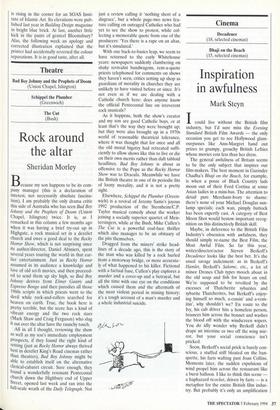Theatre
Bad Boy Johnny and the Prophets of Doom (Union Chapel, Islington) Schippel the Plumber (Greenwich) The Cut (Bush)
Rock around the altar
Sheridan Morley
Because my son happens to be its com- pany manager (this is a declaration of interest, not necessarily absolute fascina- tion), I am probably the only drama critic this side of Australia who has seen Bad Boy Johnny and the Prophets of Doom (Union Chapel, Islington) twice. It is, as I remarked in this column a few months ago when it was having a brief try-out up in Highgate, a rock musical set in a derelict church and owes a good deal to the Rocky Horror Show, which is not surprising since its author/director, Daniel Abinieri, spent several years touring the world in that ear- lier entertainment. Just as Rocky Horror assumed in its audience a knowledge and love of old sci-fi movies, and then proceed- ed to send them up sky high, so Bad Boy Johnny derives from Elmer Gantry and Expresso Bongo and then parodies all those 1960s scripts in which priests went to the devil while rock-and-rollers searched for heaven on earth. True, the book here is pretty terrible, but the score has a kind of vibrant energy and the two rock stars (Mark Shaw and Craig Ferguson) who slug it out over the altar have the raunchy touch.
All in all I thought, reviewing the show as well as my son's immediate employment prospects, if they found the right kind of setting (just as Rocky Horror always thrived best in derelict King's Road cinemas rather than theatres), Bad Boy Johnny might be able to establish itself on the alternative clerical-cabaret circuit. Sure enough, they found a wonderfully resonant Pentecostal church down the Highbury end of Upper Street, opened last week and ran into the full-scale wrath of the Daily Telegraph. Not just a review calling it 'nothing short of a disgrace', but a whole page-two news fea- ture calling on outraged Catholics who had yet to see the show to protest, while col- lecting a memorable quote from one of the producers: 'Yes there is a rape on an altar, but it's simulated.'
With one back-to-basics leap, we seem to have returned to the early Whitehouse years: newspapers suddenly clambering on shaky revivalist bandwagons, rent-a-quote priests telephoned for comments on shows they haven't seen, critics setting up shop as guardians of morality in churches they are unlikely to have visited before or since. It's not even as if we are dealing with a Catholic church here: does anyone know the official Pentecostal line on irreverent rock musicals?
As it happens, both the show's creator and my son are good Catholic boys, or at least that's the way they were brought up; but they were also brought up in a 1970s world of reasonable theatrical tolerance, where it was thought that for once and all the old moral bigotry had retreated suffi- ciently to allow shows like this to live or die on their own merits rather than daft tabloid headlines. Bad Boy Johnny is about as offensive to the Pope as the Rocky Horror Show was to Dracula. Meanwhile we have the British theatre in one of its periodic fits of loony morality, and it is not a pretty sight.
Elsewhere, Schippel the Plumber (Green- wich) is a revival of Jeremy Sams's joyous 1992 production of the Sternheim/C.P. Taylor musical comedy about the worker joining a socially superior quartet of Meis- tersingers, while at the Bush, Mike Cullen's The Cut is a powerful coal-face thriller which also manages to be an obituary of the pits themselves.
Dragged from the miners' strike head- lines of a decade ago, this is the story of the man who was killed by a rock hurled from a motorway bridge, or more accurate- ly of what happened to his killer. Fictional with a factual base, Cullen's play explores a murder and a cover-up and a betrayal, but all the time with one eye on the conditions which caused them and the aftermath of the most violent period in mining history; it's a tough account of a man's murder and a whole industrial suicide.


















































 Previous page
Previous page